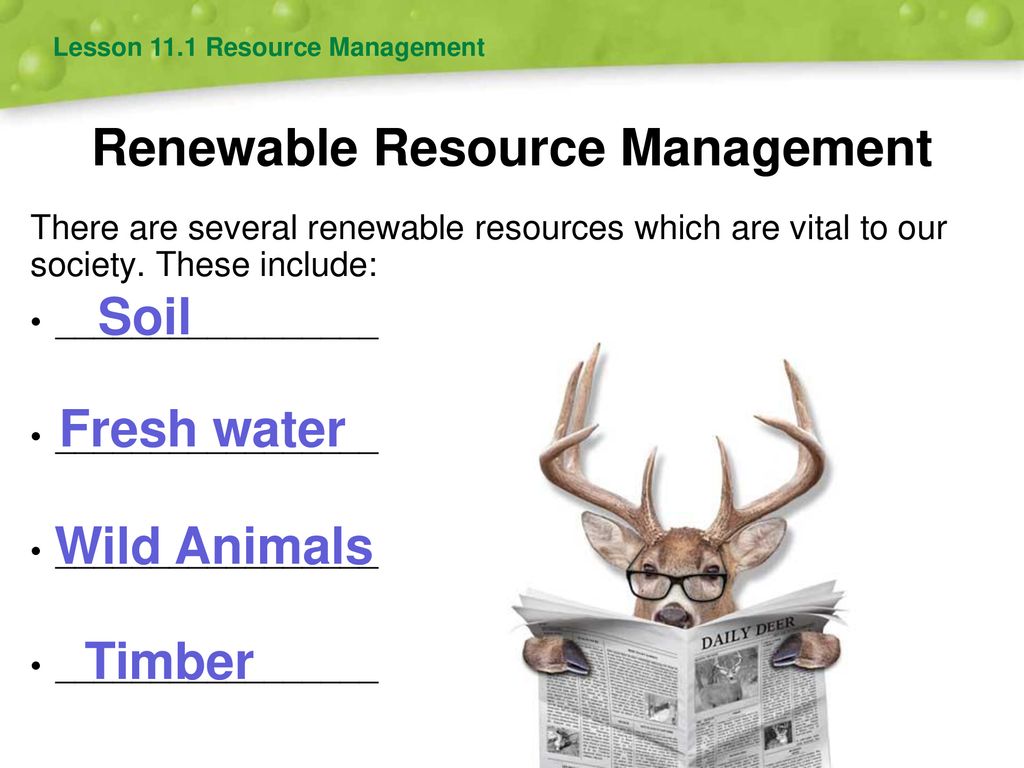
Navigating Sustainability: The Essence of Renewable Resource Management
Sustainable resource management, particularly in the realm of renewable resources, has become paramount in fostering environmental stewardship. This article delves into the principles and strategies of effective renewable resource management, exploring the significance of sustainable practices, challenges faced, and the collective responsibility in preserving our planet’s resources.
Understanding Renewable Resources: The Foundation of Sustainability
Renewable resources, ranging from solar and wind energy to sustainably harvested timber, form the foundation of sustainable living. These resources have the unique ability to replenish themselves over time, contrasting with finite, non-renewable resources. Understanding the diverse categories of renewable resources is essential for developing effective management strategies.
Principles of Effective Management: Balancing Supply and Demand
At the core of renewable resource management lies the principle of balancing supply and demand. Sustainable utilization ensures that the rate of consumption does not exceed the resource’s natural regeneration capacity. Employing strategies such as responsible harvesting, efficient energy production, and waste reduction contributes to the equilibrium necessary for long-term resource availability.
Challenges in Renewable Resource Management: Navigating Complexities
While the principles of sustainability guide renewable resource management, challenges abound. Climate change, overexploitation, and inadequate policies pose hurdles to effective management. Addressing these challenges requires a multi-faceted approach, incorporating scientific research, technological innovation, and collaboration among industries, governments, and communities.
Technological Innovations: Driving Sustainable Practices
In the realm of renewable resource management, technological innovations play a pivotal role. Advanced monitoring systems, precision agriculture, and smart grid technologies contribute to efficient resource use. These innovations not only enhance productivity but also minimize environmental impacts, illustrating the transformative power of technology in sustainable resource management.
Community Engagement: Fostering Local Sustainability Initiatives
Community engagement is a key element in successful renewable resource management. Local communities often hold valuable traditional knowledge about sustainable practices. Involving communities in decision-making processes, supporting local initiatives, and fostering education on sustainable living contribute to the holistic approach needed for effective resource management.
Policy Frameworks: Shaping the Future of Resource Sustainability
The role of government policies in shaping the trajectory of renewable resource management cannot be overstated. Well-crafted policies provide a regulatory framework that encourages sustainable practices, penalizes overexploitation, and promotes research and development in renewable technologies. The alignment of policies with environmental goals is crucial for the success of sustainability initiatives.
Corporate Responsibility: Integrating Sustainable Practices
Corporate entities bear a significant responsibility in renewable resource management. Adopting sustainable practices, implementing eco-friendly technologies, and transparent reporting on environmental impacts contribute to corporate responsibility. The integration of sustainability into business models reflects a commitment to long-term environmental preservation.
Education and Awareness: Empowering Individuals for Change
Empowering individuals with the knowledge and awareness of sustainable practices is a cornerstone of effective resource management. Educational initiatives, public awareness campaigns, and outreach programs contribute to building a collective consciousness about the impact of individual choices on the environment. An informed public is more likely to support and participate in sustainable resource management.
The Global Perspective: Collaborative Efforts for a Sustainable Future
Renewable resource management transcends borders, requiring a global perspective. International collaboration, knowledge-sharing, and joint initiatives are essential for addressing global environmental challenges. The sustainable use of resources is interconnected with the well-being of the entire planet, necessitating collective efforts to ensure a sustainable future for generations to come.
To explore further insights into the principles of Renewable Resource Management and its significance for environmental sustainability, visit businessfinancee.my.id for comprehensive analyses and resources on sustainable practices and eco-friendly initiatives.










